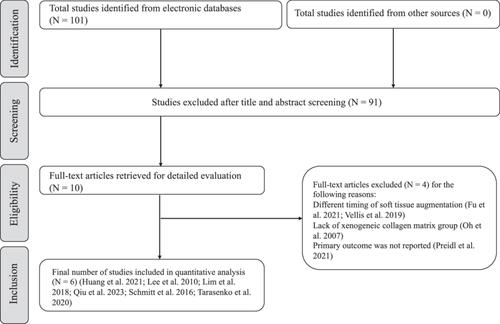Xenogeneic Collagen Matrix Versus Free Gingival Graft for Augmenting Peri-Implant Keratinized Mucosa Around Dental Implants: A Systematic Review and Meta-Analysis
Abstract
Objectives
There is a growing evidence to suggest augmenting peri-implant keratinized mucosa in the presence of ≤ 2 mm of keratinized mucosa. However, the most appropriate surgical technique and augmentation materials have yet to be defined. The aim of this systematic review and meta-analyses was to evaluate the clinical and patient-reported outcomes of augmenting keratinized mucosa around implants using free gingival graft (FGG) versus xenogeneic collagen matrix (XCM) before commencing prosthetic implant treatment.
Material and Methods
Electronic databases were searched to identify observational studies comparing implant sites augmented with FGG to those augmented with XCM. The risk of bias was assessed using the Cochrane Collaboration's Risk of Bias tool.
Results
Six studies with 174 participants were included in the present review. Of these, 87 participants had FGG, whereas the remaining participants had XCM. At 6 months, sites augmented with FGG were associated with less changes in the gained width of peri-implant keratinized mucosa compared to those augmented with XCM (mean difference 1.06; 95% confidence interval −0.01 to 2.13; p = 0.05). The difference, however, was marginally significant. The difference between the two groups in changes in thickness of peri-implant keratinized mucosa at 6 months was statistically significantly in favor of FGG. On the other hand, XCM had significantly shorter surgical time, lower postoperative pain score, and higher color match compared to FGG.
Conclusions
Within the limitation of this review, the augmentation of keratinized mucosa using FGG before the placement of the final prosthesis may have short-term positive effects on soft tissue thickness. XCM might be considered in aesthetically demanding implant sites and where patient comfort or shorter surgical time is a priority. The evidence support, however, is of low to moderate certainty; therefore, further studies are needed to support the findings of the present review.


 求助内容:
求助内容: 应助结果提醒方式:
应助结果提醒方式:


